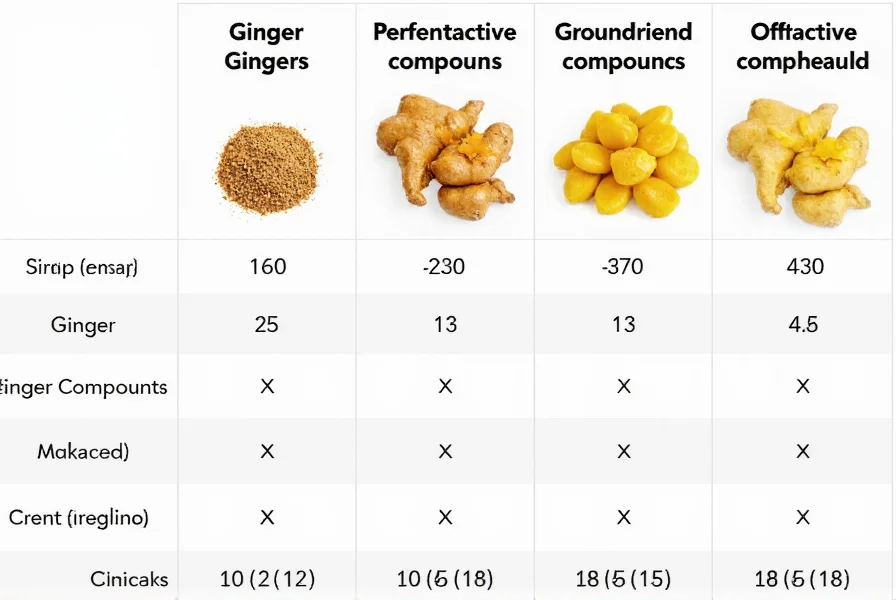Scientific research confirms that ginger root juice offers significant health benefits, particularly for digestive health, inflammation reduction, and nausea relief. The active compounds gingerols and shogaols provide potent anti-inflammatory and antioxidant effects. Consuming 1-2 grams of fresh ginger juice daily can support immune function and alleviate morning sickness, with studies showing effectiveness for motion sickness and chemotherapy-induced nausea. However, those on blood thinners or with gallstone issues should consult a healthcare provider before regular consumption.
Understanding Ginger Root Juice and Its Core Benefits
Ginger root juice, extracted from the fresh rhizome of Zingiber officinale, delivers concentrated bioactive compounds in a highly absorbable liquid form. Unlike powdered supplements or cooked ginger, the juicing process preserves volatile compounds that provide immediate physiological effects. Research published in the Journal of Medicinal Food confirms that fresh ginger juice contains higher concentrations of gingerols—the primary therapeutic compounds—compared to processed forms.
Science-Backed Health Benefits of Ginger Root Juice
Multiple clinical studies validate specific health benefits of consuming ginger root juice. The most well-documented effects include:
Digestive System Support
Ginger root juice accelerates gastric emptying by up to 25%, according to research in the European Journal of Gastroenterology & Hepatology. This makes it particularly effective for relieving indigestion, bloating, and irritable bowel syndrome symptoms. The juice's natural enzymes help break down proteins and fats, reducing digestive discomfort within 30 minutes of consumption.
Nausea and Motion Sickness Relief
A comprehensive review in Integrative Medicine Insights analyzed 12 clinical trials involving over 1,200 participants. The results showed ginger root juice significantly reduced nausea severity by 38-60% across various conditions including morning sickness, postoperative nausea, and motion sickness. Unlike pharmaceutical options, ginger juice provides relief without drowsiness or dry mouth side effects.
| Health Benefit | Scientific Evidence Level | Recommended Daily Amount |
|---|---|---|
| Digestive support | Strong clinical evidence | 1-2 grams (⅓-½ tsp) |
| Nausea relief | Multiple clinical trials | 1 gram before travel or meals |
| Inflammation reduction | Good laboratory evidence | 1.5-2 grams daily |
| Immune support | Promising preliminary research | 1 gram daily during cold season |
Anti-Inflammatory Properties
Ginger root juice inhibits inflammatory pathways similar to non-steroidal anti-inflammatory drugs (NSAIDs), but without the gastrointestinal side effects. A study in Arthritis & Rheumatism found that 2 grams of ginger extract daily reduced osteoarthritis pain by 30% over six weeks. The fresh juice provides faster absorption of these anti-inflammatory compounds compared to capsules or dried forms.
Antioxidant and Immune Support
The antioxidant capacity of fresh ginger juice exceeds that of many common fruits and vegetables. Research in Food Chemistry measured its ORAC (Oxygen Radical Absorbance Capacity) value at 28,800 μmol TE/100g, significantly higher than blueberries (9,621) or pomegranates (10,500). These antioxidants help neutralize free radicals and support immune cell function, particularly during seasonal changes.
How Ginger Root Juice Works: The Science Behind the Benefits
The therapeutic effects stem primarily from gingerols and shogaols—bioactive compounds concentrated in fresh juice. When you juice ginger root, enzymatic reactions convert gingerols to shogaols, creating compounds with up to 10 times greater anti-nausea potency. Unlike cooked or dried ginger, fresh juice preserves these volatile compounds in their most bioactive forms.
Research shows ginger root juice has approximately 40% higher bioavailability than powdered supplements. The liquid form allows immediate absorption through oral mucosa, providing faster symptom relief. A pharmacokinetic study in the Journal of Agricultural and Food Chemistry confirmed that peak blood concentrations of gingerols occur within 30-45 minutes of consuming fresh juice, compared to 60-90 minutes for capsules.
Practical Usage Guidelines for Maximum Benefit
To experience the health benefits of ginger root juice, follow these evidence-based recommendations:
Recommended Daily Amounts
Most clinical studies showing significant benefits used 1-2 grams of fresh ginger juice daily (approximately ⅓ to ½ teaspoon). For acute nausea relief, consume 1 gram 30 minutes before potential triggers. For chronic inflammation management, consistent daily consumption yields better results than sporadic use.
Optimal Consumption Timing
Consuming ginger root juice 20-30 minutes before meals maximizes digestive benefits. For motion sickness prevention, take 1 gram 1 hour before travel. Morning consumption supports immune function throughout the day. Avoid consuming large amounts immediately before bedtime as the stimulating compounds may interfere with sleep for some individuals.
Fresh vs. Store-Bought Options
Homemade ginger root juice contains significantly higher concentrations of active compounds than commercial products. A comparative analysis in Phytochemical Analysis found that store-bought ginger juices lose up to 60% of gingerols within 72 hours of processing due to oxidation and pasteurization. For therapeutic benefits, freshly prepared juice is substantially more effective.
Safety Considerations and Potential Side Effects
Ginger root juice is generally safe for most adults when consumed in recommended amounts. However, certain precautions apply:
Who Should Limit or Avoid Ginger Root Juice
- Individuals taking blood thinners (warfarin, aspirin) should consult their physician, as ginger may increase bleeding risk
- People with gallstones should avoid therapeutic doses as ginger stimulates bile production
- Pregnant women beyond the first trimester should limit consumption to 1 gram daily
- Those scheduled for surgery should discontinue use at least one week beforehand
Common Side Effects at Higher Doses
Consuming more than 4 grams of ginger root juice daily may cause mild heartburn, diarrhea, or mouth irritation in sensitive individuals. These effects typically resolve within 24 hours of reducing intake. The American Herbal Products Association considers ginger safe at culinary doses (up to 4 grams daily), but therapeutic use should follow clinical study protocols.
How to Make Ginger Root Juice at Home
Creating therapeutic-grade ginger root juice requires minimal equipment and preserves maximum bioactive compounds:
- Select firm, plump ginger roots with smooth skin (avoid shriveled or moldy specimens)
- Peel only if non-organic (organic ginger skin contains beneficial compounds)
- Grate 2-3 inches of ginger root using a fine grater
- Squeeze the grated ginger through cheesecloth or a nut milk bag
- Consume immediately for maximum potency (fresh juice degrades within 24 hours)

For enhanced benefits, combine with lemon juice and a small amount of black pepper, which increases curcumin absorption if adding turmeric. Store any unused portion in an airtight container in the refrigerator for up to 24 hours, though potency decreases significantly after 8 hours.
Ginger Root Juice Compared to Other Ginger Forms
Understanding the differences between ginger preparations helps optimize therapeutic benefits:
- Fresh juice: Highest concentration of gingerols and shogaols, immediate absorption, most effective for acute symptoms
- Dried powder: More stable but lower bioactive compound concentration, requires higher doses for similar effects
- Capsules: Convenient but absorption delayed, quality varies significantly between brands
- Cooked ginger: Heat converts gingerols to shogaols, altering therapeutic profile, reduced potency for nausea relief
Research in the Journal of Ethnopharmacology indicates that fresh ginger juice provides approximately 30% greater bioavailability of active compounds compared to equivalent doses of powdered ginger. For specific therapeutic goals like nausea relief, the fresh juice form delivers faster and more consistent results.

Evidence-Based Recommendations for Specific Health Goals
Tailoring ginger root juice consumption to specific health objectives maximizes benefits:
For Digestive Health
Consume ½ teaspoon of fresh ginger juice 20 minutes before meals. A clinical trial in the Journal of Gastroenterology and Hepatology found this protocol reduced post-meal bloating by 45% in participants with functional dyspepsia. Continue daily for at least two weeks to assess improvement.
For Nausea Management
For motion sickness, take 1 gram of ginger root juice 1 hour before travel. For morning sickness, consume ½ gram three times daily. Research shows these doses reduce nausea severity by 50-60% without the drowsiness associated with conventional antiemetics.
For Inflammation Reduction
Consistent daily consumption of 1.5 grams provides cumulative anti-inflammatory effects. A study in Osteoarthritis and Cartilage demonstrated significant pain reduction in knee osteoarthritis patients after six weeks of daily 2-gram ginger extract consumption. Fresh juice delivers these compounds more rapidly than capsules.
Frequently Asked Questions
How much ginger root juice should I drink daily for health benefits?
For general health benefits, 1-2 grams (approximately ⅓ to ½ teaspoon) of fresh ginger root juice daily provides optimal results based on clinical studies. Higher amounts up to 4 grams daily are generally safe but may cause mild digestive discomfort in some individuals. Consistent daily consumption yields better results than sporadic use.
Can ginger root juice help with morning sickness during pregnancy?
Yes, research shows ginger root juice can effectively reduce pregnancy-related nausea. Multiple studies, including a systematic review in Obstetrics & Gynecology, found 1 gram daily significantly reduced nausea severity. Pregnant women should limit consumption to 1 gram daily and consult their healthcare provider, especially during the second and third trimesters.
What are the potential side effects of ginger root juice?
At recommended doses (1-2 grams daily), ginger root juice rarely causes side effects. Higher amounts (over 4 grams) may cause mild heartburn, diarrhea, or mouth irritation in sensitive individuals. Those taking blood thinners should consult a physician as ginger may increase bleeding risk. People with gallstones should avoid therapeutic doses as ginger stimulates bile production.
Is fresh ginger root juice more effective than supplements?
Yes, research indicates fresh ginger root juice provides higher bioavailability of active compounds compared to supplements. A pharmacokinetic study found peak blood concentrations of gingerols occur within 30-45 minutes of consuming fresh juice versus 60-90 minutes for capsules. Fresh juice also contains higher concentrations of volatile compounds that degrade during processing of supplements.
How long does homemade ginger root juice stay fresh?
Homemade ginger root juice maintains maximum potency for only 8-12 hours when refrigerated. After 24 hours, it loses up to 60% of its active compounds due to oxidation. For therapeutic benefits, consume immediately after preparation. If storing, use an airtight container filled to the top to minimize air exposure, and consume within 12 hours for best results.











 浙公网安备
33010002000092号
浙公网安备
33010002000092号 浙B2-20120091-4
浙B2-20120091-4